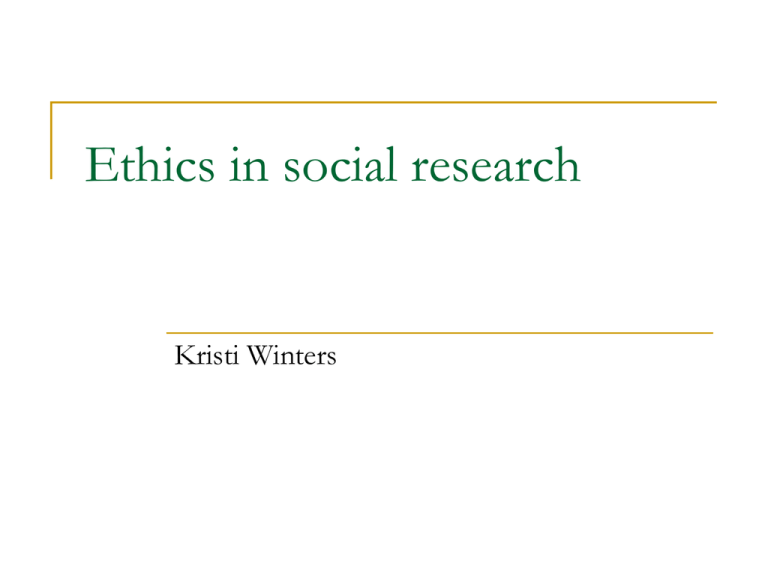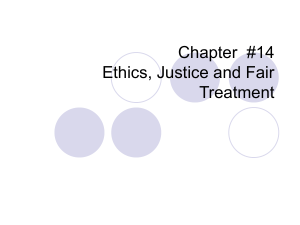
Ethics in social research
Kristi Winters
Ethics
Ethics – ‘that branch of philosophy dealing with values
relating to human conduct, with respect to the rightness
and wrongness of certain actions and to the goodness
and badness of the motives and ends of such actions.’
Our challenge: how should we treat the individuals who
participate in our research?
Are there activities in which we should not engage?
What are the professional standards of behaviour?
http://dictionary.reference.com/browse/ethics
Ethics
Ethical dilemmas are more likely to arise out of
qualitative research, more so than in quantitative survey
research.
Because quantitative research relies on data,
respondents to quantitative surveys (cross-sectional or
longitudinal) and will not be experimented upon, but
there are still issues of informed consent and protecting
the privacy of participants (UK Data Protection Act).
Study of children, qual or quants, has additional
requirements (background checks, etc.)
Ethics
Murphy and Dingwall’s (2001, p. 339) ‘ethical
theory’
Non-malfeasance – researchers should avoid
harming participants
Beneficence – research on human participants should
produce some identifiable, positive benefit, not just
be carried out for its own sake
Autonomy/self-determination – participants’ values
and decisions should be respected
Justice – all people should be treated equally
Ethics
Ethical issues in social research
Harm to participants
Lack of informed consent
Invasion of privacy
Deception
Ethics
No harm to participants – physical harm, mental
harm (stress, anguish), embarrassment, resentment at
being labelled e.g. ‘early greys’ 50 year olds’.
Is this possible?
What about IQ tests?
Ethics
Voluntary – research disrupts respondent’s normal
activity, it should be on the basis of informed consent,
Covert observation?
How to observer with vulnerable populations who may
not be able to give consent:
Children, mentally challenged, elderly, people with mental
health issues
Raises the issue of bias.
Is your volunteer sample representative?
Can you generalise your results to the wider population if only
volunteers take part?
Ethics
Anonymity – Respondent not identified in any way.
Data quality - a later researcher cannot check whether
questionnaires have been completed.
See: ‘The ethics of the secondary analysis and further use
of qualitative data.’
http://sru.soc.surrey.ac.uk/SRU56.pdf
Ethics
Confidentiality – Information is confidential. Is
this always possible?
UK Data Protection Act.
What if immoral or illegal activities are revealed?
Ethics
Deception – Deceiving respondents and
participants about the nature of research.
Why do we use blind tests? Blinding is a basic tool
to prevent conscious and subconscious bias in
research.
What level of deception is acceptable?
Sometimes you may need to be ‘economical with
the truth’ to get interviews.
BUT, this is not investigative journalism.
Ethics – new challenges
Ethics in Internet research
New area for social science research
Blogs
List-serves
Discussion groups
E-mail
Chat rooms
Instant messaging
Video clips (record events, people, activities)
Ethics – Internet research
Exciting area for new research, but ethical and data
quality issues need careful consideration.
Ethical decision-making and Internet research
http://www.aoir.org/reports/ethics.pdf
Are online postings ‘public’ and therefore informed consent is
not required?
Is lurking a form of covert non-participation? How does that
link up with informed consent?
How can a researcher protect the confidentiality of an
individual when using what they’ve posted online?
Read 3rd ed of Bryman or above link for seminar discussion.
Ethics
Norms are abstract, but how to apply on the
practical level?
Murphy and Dingwall (2001) identify two problems:
Ethical codes are not method-sensitive, may constraint
research inappropriately and unnecessarily.
Ritualistic observation of these principles may not give
real protection to participants, blunting researcher’s
sensitivities to method-specific issues when they arise.
Ethics
Research methods are neutral (statistical analysis,
interviewing as a method), but the individuals applying
them rarely are.
Do not fudge results to fit with normative or political views
– remember your study must be replicable to be valid.
What if your results suggest an undesirable conclusion?
Example: Sex and electability – women are less likely to be
elected if they run for office.
Best policy: be honest in reporting your methods and
results – admit errors and shortcomings in your research
design as well as accidental findings.
Ethical Stances
Universalism
Ethical precepts should never be broken. To do so is
morally wrong and damaging to social research.
Relative Ethics
Deception should be considered on a case-by-case basis
Ends justifies the means – deception is legitimate to gain
data which would otherwise not be available.
Ethical Stances
All research is ethically questionable
If this is the case (via deception) then dishonesty is
legitimate to gain ‘honest’ data
Ethics are irrelevant
Ethics considerations are trivial compared with the
ethical transgressions made by large institutions.
Any deception is legitimate so long as no harm comes to
the participant.
Ethical Stances
Ethical pluralism
‘Ethical concerns arise not only when we encounter
apparent conflicts in values and interests– but also when
we recognize that there is more than one ethical decisionmaking framework used to analyze and resolve those
conflicts.’ (Ess et al, 2002)
Ethics
Another aspect of ethical research considers the
originality of the work (plagiarism) and the
legitimacy of the work (fraud, fabrication of data)
‘The scientific research enterprise is built on a foundation
of trust. Scientists trust that the results reported by
others are valid. Society trusts that the results of research
reflect an honest attempt by scientists to describe the
world accurately and without bias. But this trust will
endure only if the scientific community devotes itself to
exemplifying and transmitting the values associated with
ethical scientific conduct.’ National Academy of Sciences,
2009 On Being a Scientist
Ethics
The potential ethical concerns you might encounter
in your research and how you may handle them
should form one part of your research design
Ethics section in your project essays
What ethical issues might you face?
How will you ensure your research is ethically
produced?
Six key principles of ethical research
Research should be designed, reviewed and undertaken to ensure
integrity and quality
Research staff and subjects must be informed fully about the purpose,
methods and intended possible uses of the research, what their
participation in the research entails and what risks, if any, are involved.
The confidentiality of information supplied by research subjects and
the anonymity of respondents must be respected
Research participants must participate in a voluntary way, free from
any coercion
Harm to research participants must be avoided
The independence of research must be clear, and any conflicts of
interest or partiality must be explicit
Source: ESRC Research Ethics Framework www.esrc.ac.uk
Ethics
Think about how you would develop a research proposal
that explicitly addresses the 6 points of ethical research
above.
What might be some key questions the research should
explore?
What methods would you use & why?
What potential ethical problems could you identify in
planning and undertaking a research project in this area?
How would you build up trust with participants?
What would you use the research for?
Legal considerations
Controlling access to computer systems and
files
Take the following measures to control access to
computer systems and research files:
Computers holding data will be lockable by a
password system to prevent unauthorised access
Computers holding data will be protected by a firewall
system and security-related upgrades will be carried
out regularly
Written forms, such as completed questionnaires, will
be kept in a locked cabinet
Legal considerations
Standard practice:
‘The interviewer should inform the interviewee of their
rights under any copyright or data protection laws.
‘...Researchers making audio or video recordings
should obtain appropriate copyright clearances,’
(British Sociological Association’s Statement of Ethical
Practice 2002:2).
Compliance:
discuss with participants their rights under copyright
laws and explain what signing the copyright form
means.
Consent forms
Information sheets to provide details required
under informed consent which will include:
an overview of the research project (including funding
sources, institutional affiliation and contact details)
what is involved in participating
participants have a right to withdraw at any time
usage of the data
strategies to protect confidentiality and anonymity and
copyright.
Consent forms
Consent forms which reviews the above
details and is to be co-signed by the
participant and the researcher. Participants
will be given received separate terms of
consent for interviews and focus group data
collection. The participant will be given
copies of the signed consent form for their
records.
Consent form
It will affirm:
the participant has read and understood information
about the project
s/he has been given the opportunity to ask questions
s/he voluntarily agrees to participate in the project
the participant understands that he or she can
withdraw at any time without giving reasons and
without penalty
the procedures regarding confidentiality and
anonymity have been explained to them
the use of the data in research, publications, sharing
and archiving has been understood
Schedule
Next two weeks: reading week and workshop week.
Next section will examine methods of data
gathering.










